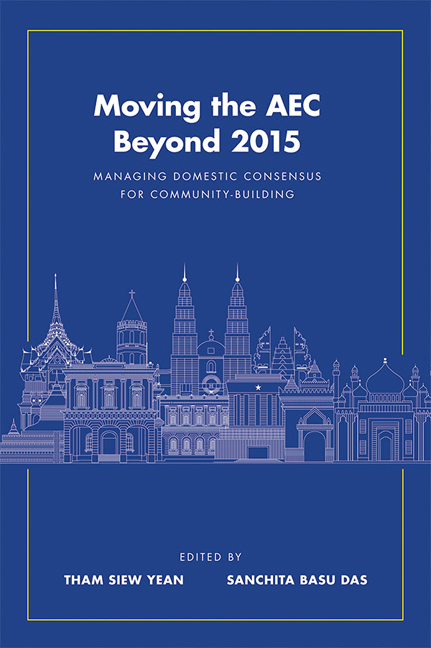Book contents
- Frontmatter
- Contents
- Foreword
- Preface
- Acknowledgements
- Abbreviations
- About the Contributors
- 1 Introduction: Economic Interests and the ASEAN Economic Community
- 2 ASEAN Economic Cooperation and Its Political Realities
- 3 Indonesia's Implementation of Facilitation and Harmonization Measures under the AEC
- 4 The AEC and Domestic Challenges in Malaysia: Examining the Liberalization of Services in AFAS
- 5 The Philippines and the AEC Beyond 2015: Managing Domestic Challenges
- 6 The AEC Beyond 2015: Implementation and Challenges for Singapore
- 7 Moving the AEC Beyond 2015: Managing Domestic Economic Interests in Thailand
- 8 Managing Domestic Consensus for ASEAN Community Building in Vietnam
- Index
3 - Indonesia's Implementation of Facilitation and Harmonization Measures under the AEC
Published online by Cambridge University Press: 06 January 2018
- Frontmatter
- Contents
- Foreword
- Preface
- Acknowledgements
- Abbreviations
- About the Contributors
- 1 Introduction: Economic Interests and the ASEAN Economic Community
- 2 ASEAN Economic Cooperation and Its Political Realities
- 3 Indonesia's Implementation of Facilitation and Harmonization Measures under the AEC
- 4 The AEC and Domestic Challenges in Malaysia: Examining the Liberalization of Services in AFAS
- 5 The Philippines and the AEC Beyond 2015: Managing Domestic Challenges
- 6 The AEC Beyond 2015: Implementation and Challenges for Singapore
- 7 Moving the AEC Beyond 2015: Managing Domestic Economic Interests in Thailand
- 8 Managing Domestic Consensus for ASEAN Community Building in Vietnam
- Index
Summary
INTRODUCTION
The date 31 December 2015 will mark the formal establishment of the ASEAN Economic Community (AEC), and the commitments behind it. While it is generally understood that the AEC is likely to liberalize the region to create a single market, most often people forget to look at other aspects of the AEC: the creation of a competitive economic region; equitable economic development; and integration with a global economy. The other three pillars of this community depend upon the commitments of member countries to facilitate economic activities and conduct regulatory harmonization instead of simply liberalizing their markets.
The facilitation and harmonization aspects of the AEC Blueprint (“the Blueprint”) are often overlooked and difficult to implement as they require changes or revisions to behind-the-border measures. For example, the implementation of the ASEAN Single Window (ASW) has been delayed due to incomplete related national initiatives. While the AEC Scorecard indicates that progress within Pillar I (measures for Single Market and Production Base) and II (measures for Competitive Economic Region) has reached 75 per cent and 86 per cent respectively in Phase III of implementation (2008–13), many of the reform measures under both these Pillars have yet to result in concrete positive outcomes. Nevertheless, they are critical for enabling member countries to gain from the AEC and to ensure greater coverage of such gains.
There are many factors behind the difficulties in implementing the facilitation and harmonization measures. These range from technical and human resource capacity to political willingness and a reluctance to undertake reforms. Some countries in ASEAN face additional challenges as they have a large population and land area as well as a relatively dispersed decision making system, as in the case of Indonesia and the Philippines. It is harder for these countries to implement behind-the-border commitments and to align domestic policy with international practices due to a decentralized governance system and a fragmented political situation.
This chapter discusses the challenges that Indonesia faces in implementing the AEC's behind-the-border commitments. The current state of implementation is highlighted to provide some background to the situation. This chapter then examines several factors behind the country's readiness (or lack of it), taking into account political economy issues and perceptions towards the AEC and economic integration in general.
- Type
- Chapter
- Information
- Moving the AEC Beyond 2015Managing Domestic Consensus for Community-Building, pp. 44 - 67Publisher: ISEAS–Yusof Ishak InstitutePrint publication year: 2016

